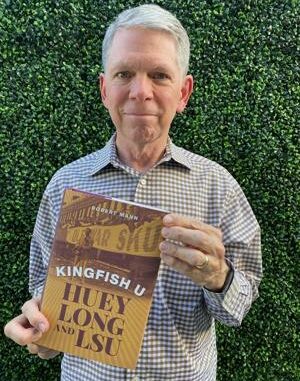
Bob Mann has written acclaimed books on the Civil Rights era, the Vietnam War, Lyndon Baines Johnson and Ronald Reagan.
For his ninth book, he stayed close to home – very close to home.
Mann, a mass communications professor at LSU, tells the story of the towering figure who played the key role in the development of the state’s flagship university.
Just published, it’s called “Kingfish U: Huey Long and LSU.”
LSU Press is the publisher.
“Although he did not attend LSU – and even attacked one of his predecessors, John Parker, for his leadership in establishing the current campus – Long became the school’s greatest fan, its leading cheerleader, its most enthusiastic benefactor, and its biggest meddler,” Mann writes.
The story remains relevant because Long’s influence continues to be felt on the university and the state’s politics, 88 years after his assassination in the State Capitol.
Before joining the Manship School’s faculty, Mann worked as a newspaper reporter covering Louisiana politics and then served as a press secretary for three senators and one governor. His previous book, “Bayous and Backrooms,” was a Louisiana political memoir.
It seemed only natural for Mann to turn his attention next to Huey Long, a subject of long fascination.
But given everything written about the one-time governor and senator, Mann asked himself how he could offer a fresh perspective. He began by delving into interviews conducted decades ago by T. Harry Williams, the legendary LSU historian and Long biographer.
He discovered that Williams had used only a fraction of his material on Long and LSU.
Mann also found the papers of several people at LSU’s Hill Memorial Library who had been forgotten to history but were central to the story.
One was an LSU law student named Kemble Kennedy, who served as Long’s eyes and ears during his early involvement with the university.
Another was Helen Gilkison, an editor of The Reveille, who was close to Long during her undergraduate years and was named by him to be the newspaper’s censor when he was at war with the students who subsequently ran it.
With all this material, “I knew I could tell a story that hadn’t been in print before,” Mann said.
As he conducted the research, however, Mann felt conflicted because he had always been sympathetic toward Long. The first politician that Mann worked for was Huey’s son, Russell, during the last part of Russell’s 38-year career in the Senate. Then Mann wrote Russell’s authorized biography. Published in 1992, it was Mann’s first book. Over the years, the author became friends with descendants of Huey and Russell.
But during his latest research, Mann came face to face with Huey Long’s unsavory side.
“I worked hard to be as objective as possible about him,” Mann said. “I wasn’t trying to please anybody in the Long family. I want them to enjoy the book. But I just thought I’d write the book as if I didn’t know anybody in the family. I want someone to read this in 20 years and think it still has relevance and rings true.
“Huey did the best things in the worst possible ways,” Mann added. “He helped build this amazing university and everything else he accomplished. But he cut a lot of corners. He got LSU in trouble, and it almost lost its accreditation. Probably the only reason he didn’t is that he died before they could complete the investigation.”
Mann is one of the best known professors at LSU because he has not been shy about criticizing the university and Republican politicians in posts on Twitter and in columns he has written over the years.
In 2021, Attorney General Jeff Landry, angry by a Mann tweet, called for him to be punished.
The demand came while Mann was researching the story of an LSU professor named John Earle Uhler who ran afoul of Long and was dismissed from his job as a result.
“He didn’t have tenure,” Mann said. “I do.”
Mann also had to decide whether to address the 1935 killing of Long and enter into the sticky debate of whether Dr. Carl Weiss had actually fired the fatal shots.
Mann solved that problem by telling the story of that momentous event through the eyes of LSU grads and officials, including Gilkison, then a reporter.
“She was the first one to rifle through Weiss’ body looking to identify him because his body was so shot up,” Mann said.
Mann also writes about Weiss’ funeral the next day at St. Joseph’s Cathedral, two blocks away from the Capitol, where hundreds gathered, including former governor Parker and one of Louisiana’s congressmen.
“It was undoubtedly the best-attended funeral of an alleged political assassin in American history,” Mann writes.


Leave a Reply